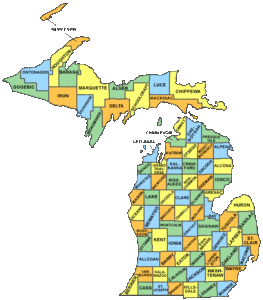House passes bills for 4-year terms; historic change headed to governor
The largest change affecting county commissioners since 1968 is headed to Gov. Gretchen Whitmer’s desk after the House of Representatives approved this week two bills to adopt four-year terms for commissioners.
Whitmer is expected to sign Senate Bill 242, by Sen. Ed McBroom (R-Dickinson), and SB 245, by Sen. Jeremy Moss (D-Oakland), which cleared the House this week on 75-29 votes. The legislation would start four-year terms with the 2024 election cycle.
“Deena (Bosworth) and I have been at MAC for 10 years and this has been at the top of the MAC to-do list every day,” said Executive Director Stephan Currie. “This is such an exciting victory after so many years of work in the halls of the Capitol. All credit goes to Deena and Meghann; Board Director Jim Storey for his consistent advocacy and testimony before committees; and, most importantly, our members who kept reminding legislators of the need for this change.”
Since 1968, voters in Michigan have elected county commissioners to two-year terms from geographic districts. Michigan has been one of only five states that has required two-year terms for all commissioners, even though all other elected county offices have four-year terms.
“This is just one of those moments you hope to have in your career in public advocacy,” said Bosworth. “I want to thank the bill sponsors, Sens. McBroom and Moss, and all of the county boards who passed resolutions in support of our effort. The power of MAC is in our members and that fact shone through this year on this issue.”
For more information on this issue, contact Deena Bosworth at bosworth@micounties.org.
Veteran Property Tax Exemption reimbursement bills introduced
 This week, Sen. Bumstead (R-Newaygo) introduced a two-bill package that would provide relief to local governments by reimbursing them for their loss of property tax revenue due to the 2013 legislation granting disabled veterans a property tax exemption. Senate Bill 783 and Senate Bill 784, co-sponsored by 11 other senators from both sides of the aisle would turn the property tax exemption into a refundable income tax credit payable to the local tax collecting unit.
This week, Sen. Bumstead (R-Newaygo) introduced a two-bill package that would provide relief to local governments by reimbursing them for their loss of property tax revenue due to the 2013 legislation granting disabled veterans a property tax exemption. Senate Bill 783 and Senate Bill 784, co-sponsored by 11 other senators from both sides of the aisle would turn the property tax exemption into a refundable income tax credit payable to the local tax collecting unit.
The legislation would still require the veteran to file an affidavit with the local tax collecting unit, the only difference is that the form will change slightly, allowing the local unit to submit for the refundable credit to cover the deferred property taxes. Upon a payment by the state, the local unit will then be required to provide written notification to the individual who filed the affidavit explaining the payment or rejection by the state.
This approach would not disrupt the current process veterans go through to get the exemption, it simply requires the local unit to defer property tax collection until the Department of Treasury dispenses the payment for reimbursement. All 100% disabled veterans, and the widowed spouses of a 100% disabled veteran, that previously claimed the veteran property tax exemption prior to January 1, 2023 are still eligible for the same benefits under the new income tax credit that goes into effect on January 1, 2023.
For more information on this issue, contact Deena Bosworth at bosworth@micounties.org.
Updated: Rules for open meetings revert to old form on Jan. 1
 Public meetings in Michigan governed by the state’s Open Meetings Act (OMA) will revert to pre-COVID rules on Jan. 1, 2022. This means that commissioners cannot participate in a county board session as a voting member via electronic means, with only one narrow exception.
Public meetings in Michigan governed by the state’s Open Meetings Act (OMA) will revert to pre-COVID rules on Jan. 1, 2022. This means that commissioners cannot participate in a county board session as a voting member via electronic means, with only one narrow exception.
As detailed in a new memo from the law firm of Cohl, Stoker & Toskey, P.C., the permissive rules for remote participation granted under Public Act 254 of 2020 expire at the end of 2021. At that point, the only way a commissioner can participate remotely as a voting member is if the member must be physically absent due to military duty.
Boards, of course, can continue to livestream their public sessions. And commissioners who cannot be physically present can utilize remote means to listen to the meeting, but they cannot participate or vote as part of the board.
The memo reminds county boards to ensure their board rules, procedures and by-laws are modified to be consistent with the Open Meetings Act.
House Bill 5467, introduced by Rep. Phil Green (R-Tuscola), would allow for some members of the public body to participate remotely where there is otherwise a quorum physically present at the in-person meeting.
However the language as currently proposed expressly prohibits the remote participant from voting, which is inconsistent with the intent to return to the previous system whereby a remote participant could vote so long as there was a quorum physically present.
MAC has expressed our interest to the bill sponsor in getting the legislation to return to the old “pre-covid” system whereby a member for any reason could participate remotely, including voting, where a quorum was physically present. While there may be opportunity to revert to allow this type of meeting option, it will not be possible to complete necessary statutory changes prior to year-end.
For more information or questions, please contact Meghann Keit-Corrion at keit@micounties.org.

Healthcare spending bill in House Appropriations Committee
Another supplemental proposal was offered this week to the House Appropriations Committee – this time related to healthcare spending. House Bill 5523, introduced by Rep. Julie Calley (R-Ionia), appropriates $1.2 billion toward efforts addressing health care recruitment and retention, as well as funding COVID testing in schools and supporting monoclonal antibody sites. The funds are all from federal dollars, with $400M from the state allocation through the American Rescue Plan Act.
Specifically, the proposal includes:
– $667 million would be allotted overall for COVID testing, of which $300 million directed to purchase COVID-19 tests= for schools
– $300 million to a Healthcare Recruitment and Retention Reserve Fund, of which $150.0 million would be available and the remaining $150.0 million is not available to be expended until funds are approved through the legislative transfer process.
– $50 million to establish COVID-19 early treatment sites.
– $25 million to purchase additional monoclonal treatment, in addition to federally allocated supply
– $10 million in a competitive grant program for nursing facilities to convert multi-resident rooms into single resident rooms. Grant awards would reimburse 50% of the cost.
A full list of details can be found here. The bill hailed praise from the healthcare sector, but with few remaining session days, the bill will likely not pass prior to the end of the legislative year.
For more information or questions, please contact Meghann Keit-Corrion at keit@micounties.org.
MAC opposes public record fee bills

The Michigan Department of Treasury announces the next Chart Chat webinar
The Michigan Department of Treasury is pleased to announce our next Chart Chat webinar at 2 p.m. on Thursday, December 16, 2021.
The Chart Chat Webinar Series provides updates to local government officials on accounting-related topics, updates from the Michigan Department of Treasury and information on sound fiscal management.
This Chart Chat webinar will cover:
- Requirements for Accepting Federal Funds
- Fiscal Indicators – A Recap of All Four and How They Work Together
- First Responders Grant Program
To register, please visit:
https://us06web.zoom.us/webinar/register/WN_5a_ki0onSvWK9R1_MI-umQ
We are currently accepting submissions for the questions and answers portion of the webinar. To submit a question, please email LAFD_Audits@Michigan.gov.
Correction: Michigan’s 83 counties will have 619 commissioners in 2023
 Michigan’s 83 county governments will be led by 619 elected county commissioners after the 2022 elections, following decisions this fall by the county apportionment boards. The Nov. 19 Legislative Update had incorrect figures for Oceana County, which changed the total.
Michigan’s 83 county governments will be led by 619 elected county commissioners after the 2022 elections, following decisions this fall by the county apportionment boards. The Nov. 19 Legislative Update had incorrect figures for Oceana County, which changed the total.
The new total is a decrease of 3 commissioners from the current roster of 622 commissioners established after the last census and apportionment process.
Eight counties increased the size of their boards for 2023. The biggest boost was 2 seats, done in 5 counties, including Kent County, which, at 21, will have the largest board in the state on Jan. 1, 2023.
Seven counties reduced the size of their boards, with the largest reduction in Antrim, which is going from 9 districts to 5. Oakland County, which currently has the state’s largest board at 21, reduced its board ranks to 19 for 2023. See full corrected list here.
MDHHS expands Opioid Health Home services to additional counties
 The Michigan Department of Health and Human Services (MDHHS) has expanded the Opioid Health Home (OHH) initiative to more Michigan counties to provide intensive care management and care coordination services for Medicaid beneficiaries with an opioid use disorder (OUD), a move applauded by MAC this week.
The Michigan Department of Health and Human Services (MDHHS) has expanded the Opioid Health Home (OHH) initiative to more Michigan counties to provide intensive care management and care coordination services for Medicaid beneficiaries with an opioid use disorder (OUD), a move applauded by MAC this week.
“The U.S. Centers for Medicare & Medicaid Services (CMS) recently approved Michigan’s State Plan Amendment (SPA) to expand its Opioid Health Home initiative into PIHP Regions 6, 7 and 10. The expanded SPA will allow thousands of Medicaid beneficiaries meeting the eligibility criteria to receive OHH services,” MDHHS reported.
A Health Home is a benefit awarded to Medicaid beneficiaries who have a diagnosed with an Opioid Use Disorder and reside within one of the following Prepaid Inpatient Health Plan (PIHP) regions/counties:
- PIHP Region 1 (counties in the Upper Peninsula)
- PIHP Region 2 (21 northern-most counties of the Lower Peninsula)
- PIHP Region 4 (specifically Calhoun and Kalamazoo Counties)
- PIHP Region 6 (Lenawee, Livingston, Monroe, Washtenaw)
- PIHP Region 7 (Wayne)
- PIHP Region 9 (Macomb County)
- PIHP Region 10 (Genesee, Lapeer, Sanilac, St. Clair)
“Individuals who meet the criteria are able to work with a team of providers who will attend to a beneficiary’s complete health and social needs. Participation is voluntary and enrolled beneficiaries may opt out at any time.”
“MAC supports additional and expanded services of this program, which has been extremely successful in many counties so far,” said Governmental Affairs Associate Meghann Keit-Corrion.
For OHH-specific information, including eligibility and available resources, visit Michigan.gov/OHH.
 Staff picks
Staff picks
- State of Michigan highlights adoption process in Branch County (WTVB-AM)
- New Health Equity Project aims to significantly reduce health disparities for vulnerable residents in five Michigan counties (Center for Health and Research Transformation)
- Modernizing American infrastructure requires people and procurement, not just dollars (Brookings Institution)
- ACLU files federal lawsuit to ensure access to medication for opioid use disorder for people who are incarcerated (ACLU of Michigan)
